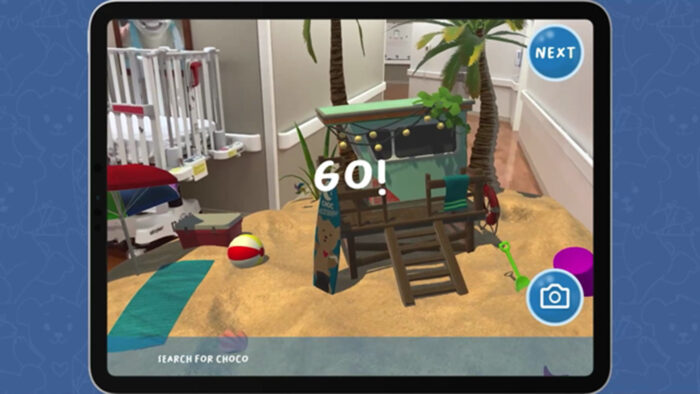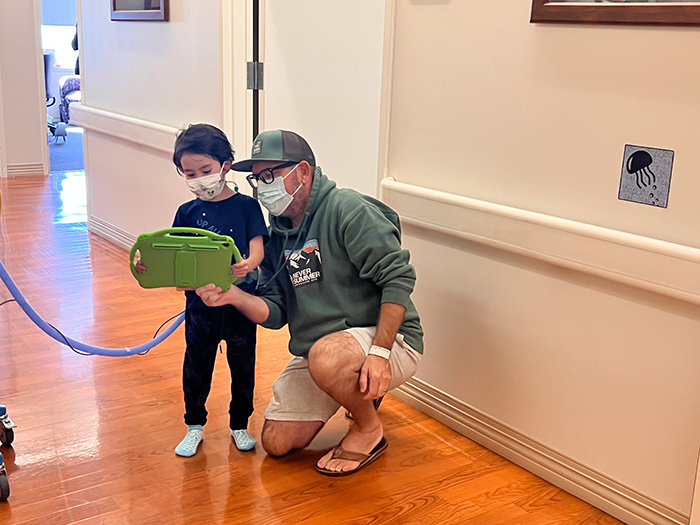First, Choco — CHOC’s beloved bear mascot — eased patients’ anxiety about MRIs. Now, he’s motivating patients to ambulate.
Choco’s Sea Adventure is the successor to MRI with Choco and the newest augmented reality (AR) module created in partnership with The Sharon Disney Lund Medical Intelligence, Information, Investigation, and Innovation Institute (Mi4) at CHOC and Eon Reality, augmented and virtual reality company.
This module takes patients on an exciting undersea adventure around the pediatric intensive care unit (PICU) at CHOC at Mission Hospital, transforming our hallways into a magical undersea adventure.
Creating a solution for the challenge of early mobility
Early ambulation (or early mobility) is any active exercise where patients assist with the activity using their own muscle strength. Ambulation during a hospital stay is vital for a patient’s physical and emotional healing and is also a requirement for hospital discharge. However, if a patient is tired, recovering from surgery or not feeling well, it can be a challenge for staff and parents to encourage them to get up and move.
That’s where Choco comes in.

A team from CHOC Mission consisting of Melissa Kawanaka, child life specialist; Paula Moran, clinical nurse; Allison O’Berry, physical therapist; and Bronwyn Stackleather, director of patient care services; worked diligently with the Mi4 team and Eon Reality to come up with an innovative solution to encourage early mobility.
The patients at CHOC Mission are encouraged to ambulate daily, so the team thought to create a game within Choco’s Sea Adventure module, making it exciting and motivating for patients to get up and play the game daily throughout the duration of their stay.
“We are passionate about providing patient care and getting our patients moving, and that drives us towards innovation,” says Allison. “We know the importance of early mobility, so it’s really exciting when we can come up with something nobody has ever tried before.”
Choco’s Sea Adventure easily navigated by patients of all ages
To use the module, patients are provided with an iPad and are directed by a narrator called “Lucy,” who is voiced by a former CHOC patient.
Lucy guides the patient to scan QR codes in the shapes of various sea creatures that are located on the walls around the unit. Then, they are transported to the ocean where they try to spot Choco near beautiful reefs, sunken ships and on the sandy shore as he plays among other sea creatures. Lucy explains that the patient should find Choco and take pictures of him by pressing the camera icon.

Once the patient spots a Choco, they’ll press the camera and hear the flash signaling that they have earned one point. The more times they find Choco and take his picture, the more points they are awarded. At the end of the module — at the final QR code station located on the other side of the PICU, patients are congratulated by Choco with a mini celebration near a big sandcastle and the patient’s final score is tallied. Then, the patient can be encouraged to beat their previous score while ambulating the next day and so on.
Choco’s Sea Adventure is a success with patients, families and staff
Choco’s Sea Adventure made a special impact on CHOC patient Kai, whose spirit was down during his hospital stay. Kai’s mom Lina remembers that he was hesitant about the module at first, but once he got up and started using it, he had a blast. He began to look forward to playing in the days following and by the end of his stay, Kai earned his highest score.
“The app is an amazing thing to have for the kiddos and the families at CHOC,” says Lina. “I feel like it will help motivate the kids to get better faster and give them something to look forward to.”
The team at CHOC Mission is thrilled with how this module turned out and looks forward to sharing many more patient success stories in the future.
“We are excited, and we are rapidly gaining momentum in the use of the module,” says Paula.
Adds Melissa: “We always think of our patients and families first. But I really think we raised the bar here in finding a creative and unique way to meet the needs of our patients and support their healing.”
Learn more about the The Sharon Disney Lund Medical Intelligence, Information, Investigation, and Innovation Institute (Mi4)




